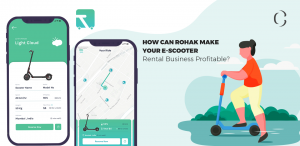Get complete insights into German shared mobility market to launch your e-scooter app successfully

Earlier this year, in February, San Francisco based scooter-sharing startup Spin rolled out its plan to expand its business internationally starting with Europe, and just within 4 months, the company has launched its scooters in Germany.
Spin was acquired by Ford Smart Mobility, the subsidiary of Ford Motor Company in the year 2018 for about $100M.
In Germany, the company is starting with the city of Cologne this week, and in Dortmund and Essen in the coming weeks. The company has also applied for permits to operate in different countries within Europe including cities of Lyon & Paris in France and Birmingham, Liverpool, London, and Manchester in the UK.
In addition to European expansion, Spin also plans to extend its services in the USA itself starting with Atlanta and Georgia. Spin currently operates in 25 cities in the USA.
Even in the times of pandemic, Spin continued operating in the cities where mobility was allowed in the USA. The company also provided free rides for the first-line warriors during the pandemic. Statistics show that the company has seen a hike of 34% in the weekly average of new daily active users, and a 44% hike in trip duration with the highest of 24 minutes per trip, in the month of May.
The trend to invest in European micro-mobility market emerged in early 2020, Spin’s European expansion is nothing but a part of a trend. Before the COVID-19 pandemic broke the land, it looked like Europe would become a summertime battleground for e-scooter companies based in both the giant market Europe and the USA, including Lime, Bird, Circ, Voi, and Tier.
Spin is starting its expansion with Germany because a recent survey conducted by YouGov & Spin suggests that the e-scooters will become the most favored mode of transit in the coming years in Germany. Let’s see why?
Insights into German shared-mobility market:
Germany has a rich history of being a progressive leader in the global transportation industry, and even domestically. More than 20% of the total German revenue comes solely from the Automotive industry. Germany has also smoothly adapted to the advancements within the industry including EVs, AVs, shared mobility, and connected vehicles. Let’s see each one of them in detail.
The car-sharing market in Germany:
Car-sharing has been a constantly evolving market in the German shared mobility industry and in the last few years, it has seen significant growth. Germany was not the first country in Europe to avail car-sharing services to its residents, but there has been a sharp increase in the number of registered number of car-sharing users in the country compared to any other European country, with a total of 2.46 million registered users by the end of 2018 from 0.35 million in 2017. Car-sharing companies in Germany follow the same principle of availing flexible on-demand transport. There are two main types of car-sharing service models that are popular in the region: classic car-sharing & flexible car-sharing.
Peer-to-peer car-sharing market in Germany:
In Germany, the peer-to-peer car-sharing service is popularly known as a private car-sharing service. In Germany, both professional car-sharing operators and private individuals make their cars available to the people. The major advantages of this model are comparatively lower prices, a wide range of car variety, and easy access to everyone including individuals from the rural region. The major players of the German peer-to-peer car-service market are Drivy, SnappCar, Turo in partnership with Daimler, and Getaway.
Ride-hailing market in Germany:
Uber is the major player in the ride-hailing market in Europe as a general and Germany is no exception to this. Hamburg recently added into the list of cities offering Uber to its residents including Berlin, Cologne, Düsseldorf, Frankfurt, and Munich.
However, Germany has way much complex rules and regulations on the service and some of these include:
-
Taxi Deutschland:
Taxi Deutschland is the national cooperative unit that represents the interest of local private taxi companies across the country and if it finds that the arrival of any such foreigner ride-hailing service is against the favor of the local players then it doesn’t take long to file a lawsuit and conjunctions against them.
-
Licensing Requirements:
The commercial transport of passengers such as taxies, limousines, and vans in Germany is regulated under the law PBefG (Personenbeförderungsgesetz), and the law mandates that the drivers of such vehicles should compulsorily own a chauffeur’s license.
-
Insurance:
German insurance law gives insurance companies a window to drop the payment of damages if it turns out that a driver has lied about the amount of private mileage v/s the business mileage.
-
German Competition:
The biggest issue any private ride-hailing company will face entering the German market for the first time is already established and successfully operating local taxi services. Even before the arrival of Uber in Germany, there were long-lasting native firms offering licensed taxi service via an app. Local players Mytaxi and Taxi.de are the biggest names in the German ride-hailing market.
The bike-sharing market in Germany:
The bike-sharing market in Germany is strongly backed and improved by the government’s initiative of sustainability in mobility. Rent-a-bike stations in Germany are set up at the main railway stations and they are called Fahrrad Mietstation, where bikes can be rented 24/7. The bikes have secured electric locks that allow users to return the bike at any said station not necessarily to a dedicated one.
Germany also offers 16000 fleets of dockless bikes to its residents from 7 different providers populating Berlin’s sidewalks. These dockless bikes can be unlocked with a smartphone app and can be left anywhere in the city.
EV adoption in Germany:
Germany had introduced a bonus scheme to encourage Germans to buy e-cars in 2016 and then extended it every year with aiming to have 1 million EVs on the streets by the end of 2022. Under this scheme, buyers get a rebate of € 4,000 on the purchase of purely electric vehicles and € 3,000 on the purchase of hybrid vehicles. Half of the rebate under the scheme was paid by the government and the other half by the car manufacturers. The German government also aims to have all newly made German vehicles be 100% emissions-free by 2030.
Europe’s biggest car manufacturing market is working hard on developing a nationwide EV charging infrastructure. The German Government has also joined hands with private automakers including BMW, Mercedes, and Volkswagen to build fast-charging networks of approximately 500 EV charging stations installed by the year 2020 in the country.
Autonomous vehicles in Germany:
Germany is the hub of the European autonomous driving industry. Unlike the USA or China, which are producing partially automated vehicles, German OEMs are providing 100% automated systems in the majority of mass-produced vehicles.
The German government has given approval to Daimler and Bosch to run their AV parking function without a human safety driver, and the companies became the world’s first 100% automated SAE Level 4 parking function open to the public and to be officially approved for daily use.
Multimodal transport solutions:
In Germany, multimodal transportation with a centralized method of finding, booking, and paying for transport is one of the emerging markets. Berliner Verkehrsbetriebe (BVG), Berlin’s public transit system is aiming to become the Amazon of transportation. BVG has a smartphone app that has all the functions that any other could offer including booking and pay for rides with private operators such as Emmy, MILES, or nextbike and also pay for the public transit. Although the payment system is unified, the app generates separate invoices for each service provider.
E-scooter sharing market in Germany:
The e-scooter sharing services have always been a popular mode of transport across Europe, as they are much cheaper, easy to navigate, and no parking hassle. Earlier e-scooters were banned in Germany but in 2019, the German government has passed a law: Regulation for Devices with Handlebars and Handrails that enables e-scooters to circulate on roads and cycle paths but forbids their movement on the pavements. Also, it clearly states that the riders must be the age of 14 or above and must ride with a maximum speed of 20 km/hour.
E-scooters then started to pop up on the streets of Germany after the government gave a green signal in may, 2019. For example:
- Emmy is an electric moped scooter-sharing company that offers over 2000 moped scooters in the cities of Germany including Berlin, Dusseldorf, Hamburg, and Munich.
- Frank-e is another e-scooter sharing company that is operational in Frankfurt, Germany.
- TIER Mobility also launched its e-scooter sharing service in 8 German cities including Berlin (HQ), Bonn, Cologne, Düsseldorf, Frankfurt, Hamburg, Munich, and Münster.
- Circ operates in 21 cities across 7 countries and also entered the German mobility market in 2019.
- Lime is operational in Berlin, Cologne, Dresden, Frankfurt, Hamburg, and Munich cities of Germany.
- VOI is operational in over 30 European cities and 4 German cities including Augsburg, Berlin, Nuremberg, and Potsdam.
How can Coruscate help you launch your e-scooter app successfully in Germany?
Certainly, not every hype in a way has to be picked up. But anyone who wants to enter the micro-mobility business needs to observe the existing market closely and carry out realistic market potential analyses.
In this case, Germany is already a fertile micro-mobility market and Coruscate is here to help you plant the strong seed of your micro-mobility business by providing the advanced technical solution and that will lead your business to grow exponentially.
Contact us now for a personalized quote and live demo of the solution we develop.









